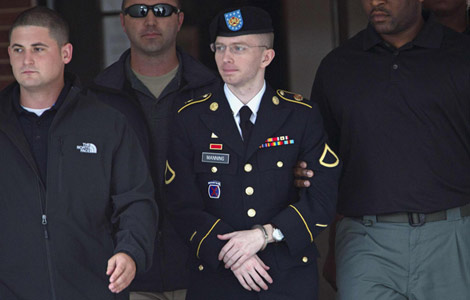Manning gets 35 years in WikiLeaks trial
Updated: 2013-08-22 06:38
(Agencies)
|
||||||||
A TROUBLED YOUNG MAN
In the sentencing phase of the court-martial, Manning's attorneys portrayed their client as a troubled young man, who questioned his sexual identity and showed signs of anger that included punching a fellow soldier and grabbing for a gun during a counseling session. Those actions, defense attorneys argued, were signs that Manning was unfit for deployment to a war zone.
In that light, some observers described the sentence as unusually harsh.
"The government is looking for general deterrence of future Bradley Mannings," said Jeffrey Walker, an expert on military law and professor at St. John's University. "Thirty-five years is a pretty powerful message. I think they could have sent it with less than 35 years."
Other observers agreed the sentence would be a powerful deterrent and in future help to protect national security.
"The message will be sent in a loud and clear fashion to all those in uniform that they do not get to make decisions on what is legitimate and what is not, with regard to US policy," said Steven Bucci, a foreign policy specialist at the Heritage Foundation.
Americans convicted of passing secrets to foreign governments have faced stiffer sentences. Former FBI agent Robert Hanssen was sentenced to life in prison after pleading guilty in 2001 to spying for Russia and the Soviet Union. Former Navy intelligence analyst Jonathan Pollard in 1987 also got a life sentence after passing classified information to Israel.
Manning's lawyers were due to speak with reporters later on Wednesday. Prosecutors declined to comment after the sentence was read.
CHALLENGE OF KEEPING SECRETS
The Manning court-martial highlights the difficulty of keeping secrets in the Internet age. It comes at a time when US security agencies, with a large number of analysts granted access to secret files, are under great pressure to piece together disparate intelligence threads to head off attacks such as the April bombings at the Boston Marathon.
At the same time, the US government is seeking the return of former CIA contractor Edward Snowden, who in June turned over details of secret US programs to monitor the phone and Internet traffic of Americans. He has been granted temporary asylum by Russian authorities.
One sign of US determination to send a message came early this year when Manning pleaded guilty to 10 lesser charges, but military prosecutors opted to push ahead and seek convictions on more serious criminal counts including espionage and aiding the enemy.
Lind found Manning guilty of espionage but not of aiding the enemy, a crime that would have carried a sentence of life in prison without parole.
"For the US to have continued prosecuting him under the Espionage Act, even charging him with 'aiding the enemy,' can only be seen as a harsh warning to anyone else tempted to expose government wrongdoing," said Widney Brown, senior director of international law and policy at Amnesty International.
Most Viewed
Editor's Picks

|

|

|

|

|

|
Today's Top News
Bo Xilai denies bribery charges against him
US senator's comments draw fire
Chinese scientists asked to improve toilet
Experts say police need guns on patrol
Nasdaq resumes stock trading
German mitten crabs not 'qualified for import'
Chinese netizens debate upping retirement age
Egypt's Mubarak leaves prison
US Weekly

|

|
















